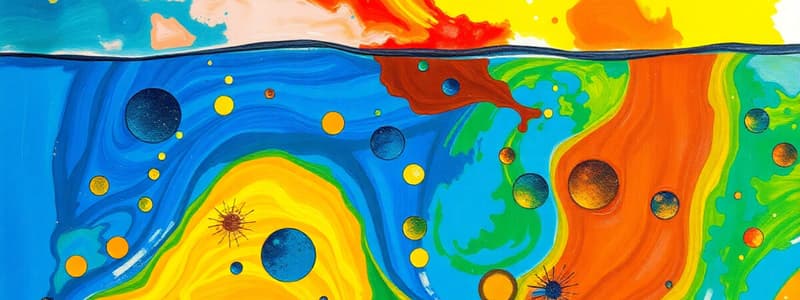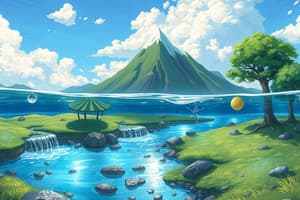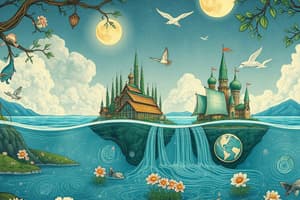Podcast
Questions and Answers
What does solubility refer to?
What does solubility refer to?
- The state of being insoluble in a solvent
- The temperature at which a solute dissolves
- The amount of solvent needed to dissolve a solute
- The maximum amount of solute that can dissolve in a solvent (correct)
The solubility of a substance in water remains constant regardless of temperature.
The solubility of a substance in water remains constant regardless of temperature.
False (B)
Which process involves water vapor cooling down to form small water droplets?
Which process involves water vapor cooling down to form small water droplets?
- Precipitation
- Condensation (correct)
- Transportation
- Evaporation
What factors can affect the solubility of a substance in water?
What factors can affect the solubility of a substance in water?
Precipitation occurs when clouds are carried to different locations by the wind.
Precipitation occurs when clouds are carried to different locations by the wind.
The limited amount of a solute that can dissolve in a solvent is known as its __________.
The limited amount of a solute that can dissolve in a solvent is known as its __________.
Match the following terms with their correct descriptions:
Match the following terms with their correct descriptions:
What is the term for the complete cycle of water moving between liquid and vapor states in nature?
What is the term for the complete cycle of water moving between liquid and vapor states in nature?
The rate of evaporation is higher when the humidity is ______.
The rate of evaporation is higher when the humidity is ______.
Match the water cycle processes with their descriptions:
Match the water cycle processes with their descriptions:
What is the process called when water vapor changes into liquid water?
What is the process called when water vapor changes into liquid water?
The temperature of water changes when it boils.
The temperature of water changes when it boils.
What energy change occurs when water freezes?
What energy change occurs when water freezes?
During melting, energy is __________ from the surroundings.
During melting, energy is __________ from the surroundings.
Match the following changes of states with their definitions:
Match the following changes of states with their definitions:
Which of the following processes involves a liquid changing into a gas?
Which of the following processes involves a liquid changing into a gas?
The boiling point is the temperature at which a solid turns into a liquid.
The boiling point is the temperature at which a solid turns into a liquid.
What is the term for a substance that is dissolved in a solution?
What is the term for a substance that is dissolved in a solution?
The process of a gas changing into a liquid is called ______.
The process of a gas changing into a liquid is called ______.
Match the physical states with their definitions:
Match the physical states with their definitions:
Which term describes the ability of a substance to dissolve in another substance?
Which term describes the ability of a substance to dissolve in another substance?
All substances have the same rate of dissolving when combined with a solvent.
All substances have the same rate of dissolving when combined with a solvent.
The continuous movement of water between the Earth's surface and the atmosphere is known as the ______.
The continuous movement of water between the Earth's surface and the atmosphere is known as the ______.
What is the change in state from ice to water called?
What is the change in state from ice to water called?
The boiling point of water is 0 °C.
The boiling point of water is 0 °C.
What is the process of water changing from a liquid to a gas at temperatures below its boiling point?
What is the process of water changing from a liquid to a gas at temperatures below its boiling point?
Water vapor is the _____ state of water.
Water vapor is the _____ state of water.
Match the following processes with their corresponding changes in state:
Match the following processes with their corresponding changes in state:
Which term describes a substance that dissolves in water?
Which term describes a substance that dissolves in water?
A solute is always a liquid.
A solute is always a liquid.
What is formed when sugar dissolves in water?
What is formed when sugar dissolves in water?
The rate of dissolving of a solute increases when the temperature of water is ______.
The rate of dissolving of a solute increases when the temperature of water is ______.
Match the following terms with their definitions:
Match the following terms with their definitions:
What happens when a saturated solution is formed?
What happens when a saturated solution is formed?
The solubility of a substance in water remains unchanged with temperature.
The solubility of a substance in water remains unchanged with temperature.
What is the definition of solubility?
What is the definition of solubility?
A __________ solution contains the maximum amount of solute that can dissolve at a specific temperature.
A __________ solution contains the maximum amount of solute that can dissolve at a specific temperature.
Match the following solubility concepts with their descriptions:
Match the following solubility concepts with their descriptions:
Which of these processes is not involved in the water cycle?
Which of these processes is not involved in the water cycle?
Water can exist in only two physical states: liquid and vapor.
Water can exist in only two physical states: liquid and vapor.
What role does the Sun play in the water cycle?
What role does the Sun play in the water cycle?
The process by which water changes from vapor to liquid is called __________.
The process by which water changes from vapor to liquid is called __________.
Match the following factors to their effects on the rate of evaporation:
Match the following factors to their effects on the rate of evaporation:
Flashcards
Solubility
Solubility
The maximum amount of a substance (solute) that can dissolve in a given amount of liquid (solvent) at a specific temperature.
Solute
Solute
The substance that dissolves in a solvent.
Solvent
Solvent
The substance that dissolves the solute.
Solubility of a Substance
Solubility of a Substance
Signup and view all the flashcards
Solubility and Temperature
Solubility and Temperature
Signup and view all the flashcards
Boiling
Boiling
Signup and view all the flashcards
Boiling Point
Boiling Point
Signup and view all the flashcards
Condensation
Condensation
Signup and view all the flashcards
Solution
Solution
Signup and view all the flashcards
Universal Solvent
Universal Solvent
Signup and view all the flashcards
What is the water cycle?
What is the water cycle?
Signup and view all the flashcards
What is evaporation?
What is evaporation?
Signup and view all the flashcards
What is condensation?
What is condensation?
Signup and view all the flashcards
What is transportation in the water cycle?
What is transportation in the water cycle?
Signup and view all the flashcards
What is precipitation?
What is precipitation?
Signup and view all the flashcards
Temperature during state change
Temperature during state change
Signup and view all the flashcards
Energy absorption during state change
Energy absorption during state change
Signup and view all the flashcards
Energy release during state change
Energy release during state change
Signup and view all the flashcards
Evaporation
Evaporation
Signup and view all the flashcards
Melting
Melting
Signup and view all the flashcards
Melting Point
Melting Point
Signup and view all the flashcards
Freezing
Freezing
Signup and view all the flashcards
Freezing Point
Freezing Point
Signup and view all the flashcards
What is a solute?
What is a solute?
Signup and view all the flashcards
What is a solvent?
What is a solvent?
Signup and view all the flashcards
What is a solution?
What is a solution?
Signup and view all the flashcards
What does it mean for a substance to be soluble?
What does it mean for a substance to be soluble?
Signup and view all the flashcards
What does it mean for a substance to be insoluble?
What does it mean for a substance to be insoluble?
Signup and view all the flashcards
Factors affecting dissolving rate
Factors affecting dissolving rate
Signup and view all the flashcards
Saturated Solution
Saturated Solution
Signup and view all the flashcards
Study Notes
- Solubility is the limited amount of a solute which can dissolve in a given amount of solvent.
- Different substances have different solubilities in water.
- Solubility changes with temperature.
Studying That Suits You
Use AI to generate personalized quizzes and flashcards to suit your learning preferences.




